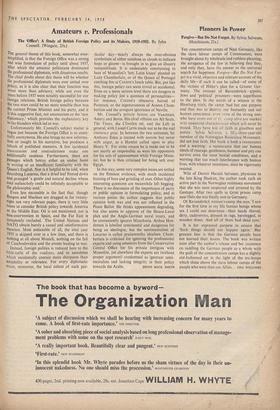Planners in Power
Forgive—But Do Not Forget. By Sylvia Salvesen. (Hutchinson, 21s.)
THE concentration camps of Nazi Germany, like the slave labour camps of Communism, were brought about by wholesale and ruthless planning; the arrogance of the few in believing that they, and only they, have the answer to the universal search for happiness. Forgive—But Do Not For- get is a vivid, objective and tolerant account of the daily life—if such it can be called—of some of the victims of Hitler's plan for a Greater Ger- many. The inmates of Ravensbrtick—gipsies, Jews and 'political' prisoners—were superfluous to the plan. In the words of a witness at the Hamburg trials, the camp 'had but one purpose and that was to ,destroy our humanity and our human conscience; even some of the strong ones who have come out of th camp alive are marked with unnatural characteristics which will never be erased. They have lost all faith in goodness and justice.' Sylvia Salvestm, a fifty-three-year-old member of the Norwegian Resistance Movement. did not lose faith. Her book is both a reassurance and a warning : a reassurance that our human ideals of courage, gentleness, humour and pity can survive even the most bestial conditions, and a warning that too much interference with human lives, with whatever intentions, must be vigorously resisted.
Wife of Doctor Harald Salvesen, physician to the late King Haakon, the author took such an active part in the Norwegian resistance movement that she was soon suspected and arrested by the Gestapo. After two spells in Grini prison camp near Oslo she was finally, sent to Germany.
Of Ravensbrtick women's camp she says, 'I saw for the first time in my life human beings whose sex I could not determine—their heads shaved, dirty, cadaverous, dressed in rags, barelegged, in wooden shoes. And all ,of them had dead eyes.'
It is her expressed purpose to ensure that `Such things should not happen again.' Her greatest fear is that the German people have not learned their lesson. The book was written soon after the author's release and her insistence on saddling the German people as a whole with the guilt of the concentration camps has a slightly old-fashioned air in the light of the arc-lamps which shine above the slave labour camps of the people who were then our Allies. ERIC WILLIAMS






























 Previous page
Previous page